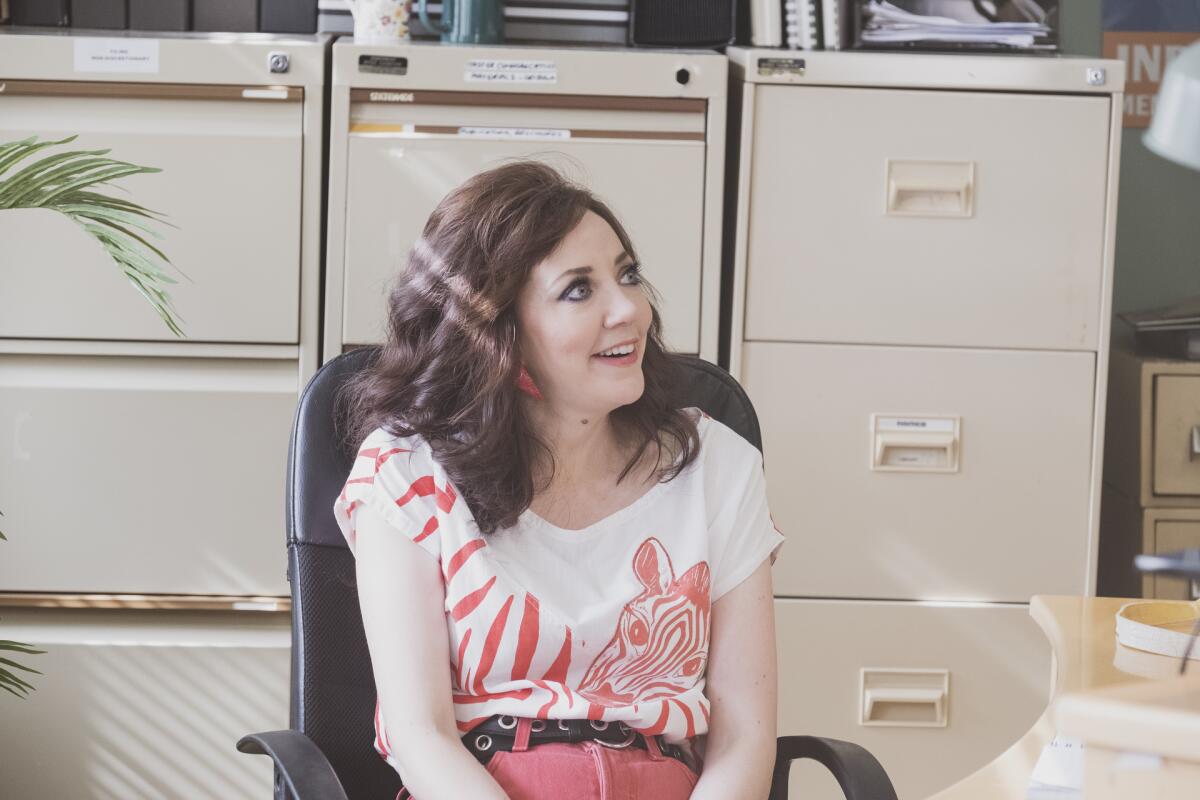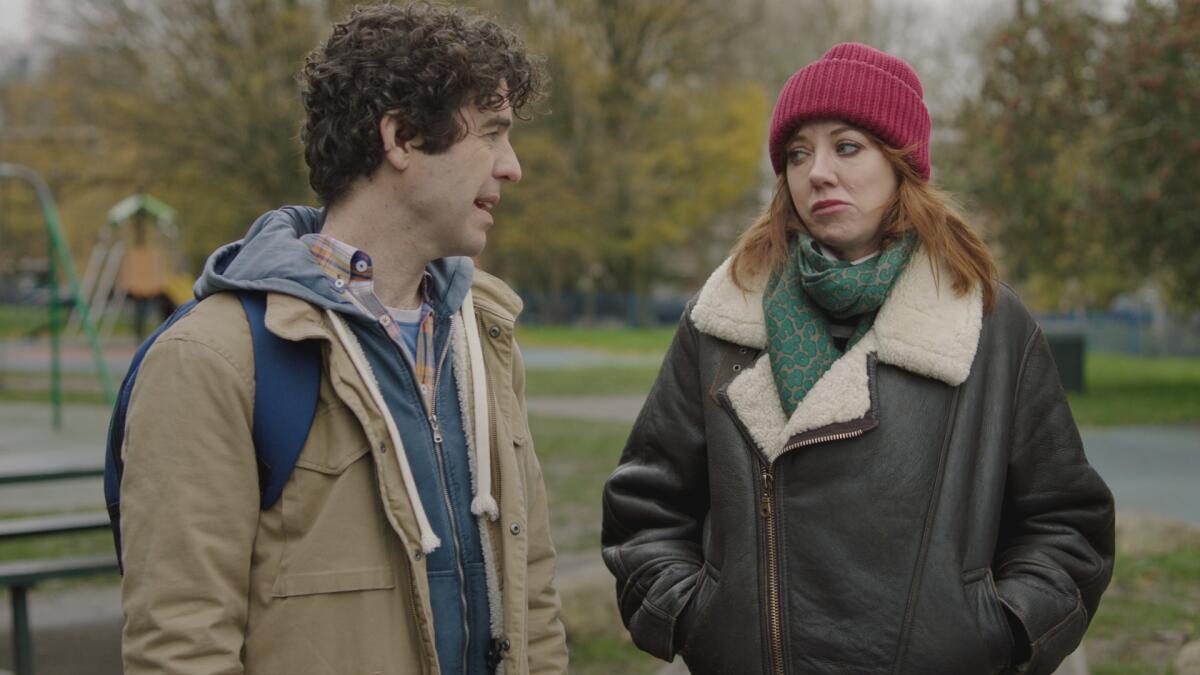Some youngsters aspire to be medical doctors, astronauts, lecturers or firefighters. Rising up in Bolton, a former mill city within the north of England, Diane Morgan was fascinated with one factor: comedy. She watched a whole lot of it, principally British. Peter Sellers, “Fawlty Towers,” Monty Python.
When she landed in drama faculty, she instructed the pinnacle of this system, “‘Look, I’m not here for the Shakespeare’ — so they gave me Lady Macbeth, all the big roles,” she recalled in a video chat from her London residence. “All these lovely, beautiful girls who wanted to play the ingenues — they hated me because they were like, ‘Why is she getting these parts? She wants to be the stupid maid.’”
A number of a long time later, Morgan’s dedication to enjoying the idiot has paid off. Since 2013, she has starred as Philomena Cunk, a know-nothing TV pundit, in a sequence of mockumentaries about historical past, philosophy, artwork and science (together with “Cunk on Earth”). As she strides by way of picturesque places, wearing tweed, and sits down with distinguished consultants from the world of academia, she seems to be each bit the a part of a BBC presenter. Then she does issues like ask an Oxford professor, “What was more culturally significant, Beyoncé’s hit ‘Single Ladies’ or the Renaissance period?” and the phantasm of gravitas is (hilariously) ruptured.
The most recent quantity within the “Cunk” canon, “Cunk on Life,” premieres Thursday on Netflix. Cunk stays as deadpan and ill-informed as ever, asking nice philosophers and physicists “some of the most significant questions you can ask with a mouth.” In a single significantly absurd scene, she tells a famend British surgeon that solely 40% of individuals have skeletons. Everybody else, she says, is “solid meat.”
Morgan has a exceptional skill to take care of a straight face all through these interviews. It’s all concerning the strain, she says. “I know that as soon as I laugh, it’s not funny.” She admits she does “corpse” — or crack up — every now and then, significantly with sure consultants, like Douglas Hedley, a professor of the philosophy of faith at Cambridge College who has develop into a recurring speaking head within the “Cunk” universe. “He talks very slowly, but he’s brilliant. I think the straighter and more serious they are, the more it tickles me,” she says.
Ricky Gervais and Diane Morgan in “After Life.”
(Natalie Seery)
The lecturers who seem in “Cunk” could also be conscious that Morgan is doing a bit for a comedy program, however they nonetheless react to her character’s idiotic questions with real shock and exasperation. Within the early days, earlier than Cunk turned well-known, there was extra confusion.
“We had some real eggheads, and famously, they don’t watch comedy. Then you trample all over their favorite topic” and issues can get tense, she says. One knowledgeable grew so irritated they needed to pause filming whereas he calmed down. “I said, ‘Don’t stop if that happens again.’ I was willing for him to punch me, because I thought it would make great TV. If he breaks my nose, it’ll heal.”
“I think they genuinely feel a bit defensive of their subject matter,” says “Cunk on Life” creator Charlie Brooker, who can be the power behind the techno-dystopian anthology sequence “Black Mirror.” He’s normally not bodily current when Morgan is filming the interviews as a result of, he says, “I find it too cringe. I would die.”
Brooker says Morgan “doesn’t mind an awkward silence, which comes in really handy when she’s doing the interviews, because sometimes they will last an hour, 70% of which is awkward silence.”
The consultants, a few of whom have develop into recurring favorites, “seem to really enjoy the fact that they’re there,” Brooker says. “The sad thing is, experts don’t get interviewed on mainstream TV very often anymore.”
Over time, Cunk has grown extra antagonistic towards the speaking heads she interrogates, and extra prepared to counter their arguments with doubtful anecdotal proof. (“My mate Paul” is one in all her most continuously cited sources.)
“That feels like a modern-day thing,” Brooker says. “People are less shy these days about saying to an expert, ‘Yeah, whatever, you may have studied this subject for 25 years, but I just watched a video on YouTube which tells me your life’s work is bulls—. I’ll tell you why we didn’t land on the moon, or vaccines don’t work. There’s an arrogant swagger to a lot of the alternative truth crowd.
“There’s something funny about watching her attack their professions, things they care passionately about, from her position of slightly bored detachment,” he provides.

Diane Morgan within the Max comedy “Frayed.”
(Lisa Tomasetti / HBO Max)
Morgan’s Bolton accent in some way provides to the character’s dry comedic have an effect on. When Morgan was learning on the East 15 Performing College, she was instructed the way in which she spoke can be an impediment to getting work.
“It’s madness, because every part I’ve had since then, it’s the accent that’s got it,” she says. “In drama school, they always want to stamp out the interesting bits about you and build you back up into an actor that they think people want. But actually, people want weirdness. They want individuality, don’t they? They want humps and lumps and weird eyes.”
Morgan spent practically 10 years performing stand-up in London, an expertise that was at the least as priceless as drama faculty. “You learn a lot very quickly about how not to bore people,” she says.
Throughout these lean years, she made ends meet by working a string of depressing jobs. There was a stint as a telemarketer, cold-calling folks to ask in the event that they wanted a brand new accountant, and a very grim gig packing worming tablets for canines for 10 hours a day, with no speaking or sitting allowed. “It was the worst experience, but it made me think, ‘I’ve really got to make this work. I’ve really got to pull my socks up and do something with my life, because I don’t want to end up here,’” Morgan says.
To finish the stereotype, the character was speculated to sound extra posh. However Morgan insisted on asking for added time in her audition to play Cunk in her personal voice. “I’d never had the balls to do that,” she says. “It was just funnier, because my own accent is quite flat, and it lends a sort of misery to everything.”
Brooker was “absolutely floored” by the audition. Morgan brings “an odd comic unknowability” to Cunk, he says. “There’s something very curious about the character, where she is sort of alien and otherworldly but simultaneously vapid in a cosmic way,”
“Everyone was quite nervous about it — would this new character work or not?” Morgan recollects. “If it hadn’t, I’d have been axed immediately and taken off and shot around the corner. But it worked.”

Morgan, proper, with Paul Prepared in “Motherland.”
(Sundance Now / BBC Footage)
Cunk turned a breakout character, showing in recurring segments after which anchoring standalone specials, together with “Cunk on Britain” and — sure — “Cunk on Shakespeare.” (Standout quote: “School in Shakespeare’s day and age was vastly different to our own. In fact, it was far easier because he didn’t have to study Shakespeare.”)
“It’s nice to have someone like that, who just doesn’t give a toss,” she says of her “Motherland” function. “I used to get moms running up to me in the street every day: ‘Thank God for this. I thought I was the only one.’”
She additionally wrote, directed and starred within the defiantly bizarre comedy “Mandy,” which follows an unemployable lady as she skips from one odd job to the subsequent.
Morgan sometimes thinks it will be good to do one thing a bit grittier and extra dramatic. “But I’ve still got no interest in Shakespeare.”




